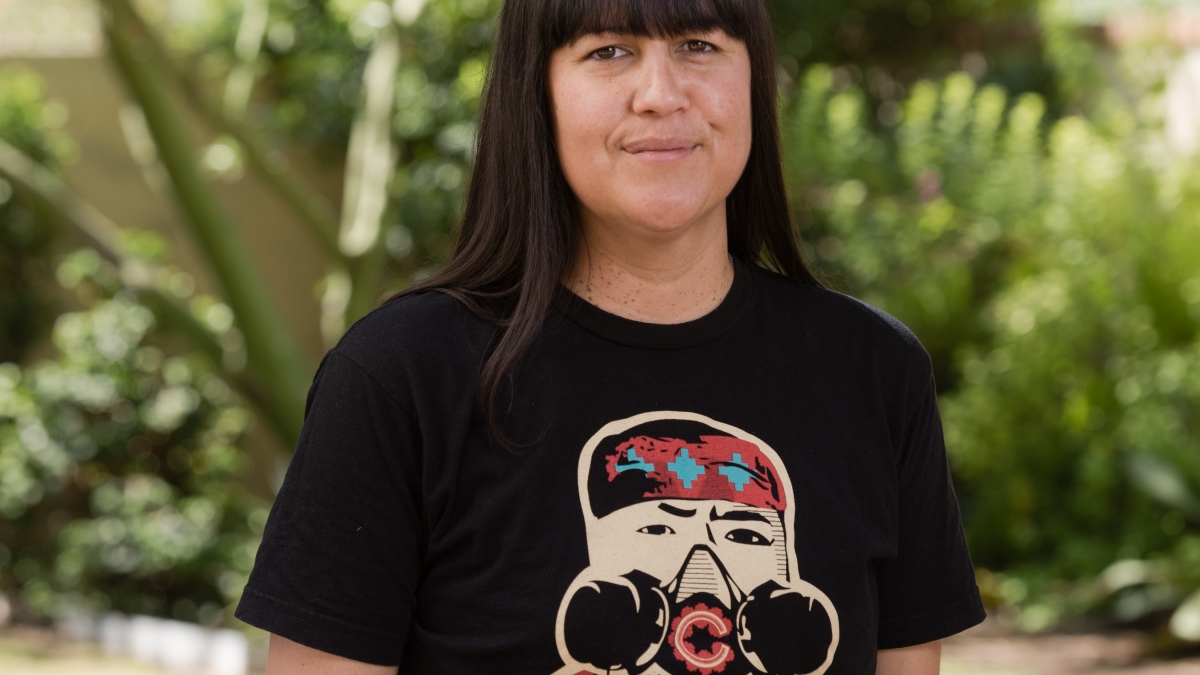Natalie Diaz appointed Marshall endowed chair in poetry at ASU

Natalie Diaz is the new holder of the Marshall endowed chair in poetry at ASU, which provides funds for a professor in the Department of English who is “a major poet and rising star in the field of American poetry” to use for research, travel and other scholarly activities. Diaz was also recently named a MacArthur Foundation Fellow. Photo courtesy of the John D. & Catherine T. MacArthur Foundation
Arizona State University Associate Professor Natalie Diaz has been named the Maxine and Jonathan Marshall Chair in Modern and Contemporary Poetry at Arizona State University.
The endowed chair provides funds for an ASU professor in the Department of English who is “a major poet and rising star in the field of American poetry” to use for research, travel, and other scholarly activities. The money also supports graduate research assistantships to strengthen student recruitment and the teaching and learning of poetry.
“Natalie Diaz was, even before I came to ASU, one of my favorite poets,” said Jeffrey Cohen, dean of humanities in the College of Liberal Arts and Sciences, of which the Department of English is an academic unit. “Her works ‘Abecedarian Requiring Further Examination of Anglikan Seraphym Subjugation of a Wild Indian Rezervation’ and ‘It Was the Animals’ have frequently visited my classroom (and one is in my book project in progress).
“The Marshall family wanted to honor through the endowment the best in contemporary poetry,” Cohen continued, “so I cannot imagine a better choice than Professor Diaz.”
The Marshall Chair is named in honor of Maxine Besser Marshall (Sociology '76) and Jonathan Marshall, former newspaper publishers and prominent Valley philanthropists.
“It is exciting to imagine how we might continue the good work and energy of Maxine and John Marshall here at ASU and within the smaller and larger poetry communities of Arizona,” Diaz said. “Poetry, like any good story, like any generous and well-intentioned language, has the power to change a single moment as well as lift and sustain a movement. Arizona has a long history of language and poetry, from our indigenous languages, to Spanish, to the many different languages our guests and neighbors and families bring into our lexicons.
“It is an honor and a joy to help envision and enact the next moments we all might come together — across a page, a room, our campus or our state — to share our stories and our poetries and how we all might be better for it.”
The Marshalls created the fund in 2001, and the first Marshall Chair — poet and translator Cynthia Hogue — assumed the role in 2003. Professor Hogue held the position until her retirement from ASU in December 2017.
“That inspiring and timely notion of giving forward — Emily Dickinson called it ‘dowering,’ the gift without conditions — surely characterizes Maxine and her beloved husband, Jonathan, in all they did and gave,” wrote Hogue in a 2013 newsletter article about the philanthropically minded couple. Maxine and Jonathan also funded the Marshall Distinguished Lecture Series, an annual College of Liberal Arts and Sciences event that “brings to ASU nationally known scholars concerned with promoting culture through the humanities and a better understanding of the problems of democracy.”
Diaz teaches in English’s creative writing program. Earlier this month, she was awarded a MacArthur Foundation fellowship, known informally as a “genius grant.” The fellowship is a prestigious honor, a recognition of exceptional creativity, and it is not, the foundation emphasizes, a lifetime achievement award but instead a search for people on the verge of a great discovery or a game-changing idea.
Born and raised in the Fort Mojave Indian Village in Needles, California, Diaz is Mojave and an enrolled member of the Gila River Indian Tribe. Her first poetry collection, "When My Brother Was an Aztec," was published to critical acclaim by Copper Canyon Press in 2012. Her next collection, “Postcolonial Love Poem,” is forthcoming from Graywolf Press in 2020. She is a Lannan Literary Fellow and a Native Arts Council Foundation Artist Fellow. She was awarded a Bread Loaf Fellowship, the Holmes National Poetry Prize, a Hodder Fellowship and a PEN/Civitella Ranieri Foundation Residency, as well as being awarded a U.S. Artists Ford Fellowship.
In addition to being renowned on the page, Diaz is known for her Mohave language activism. She is also a frequent collaborator with other artists and poets. She wrote, curated and led an exhibit at the Whitney Museum of American Art in New York City titled “Words for Water: Stories and Songs of Strength by Native Women” that featured a collective of indigenous female poets, writers and musicians exploring the power of language, story and song in the fight for environmental and cultural justice.
Diaz is also the founder of archiTEXTS, a program that facilitates conversations and collaborations between people who value poetry, literature and story. In November 2017, archiTEXTS held an event at ASU called “Legacies: A Conversation With Sandra Cisneros, Rita Dove and Joy Harjo,” in which the authors discussed their personal journeys through the American literary landscape.
The chair appointment is for a period of five years, with a possibility of renewal.
A celebration of Diaz’s accomplishments and naming as Marshall Chair will take place Feb. 21, 2019. More details are forthcoming.
More Arts, humanities and education

Professor's acoustic research repurposed into relaxing listening sessions for all
Garth Paine, an expert in acoustic ecology, has spent years traveling the world to collect specialized audio recordings.He’s been…

Filmmaker Spike Lee’s storytelling skills captivate audience at ASU event
Legendary filmmaker Spike Lee was this year’s distinguished speaker for the Delivering Democracy 2025 dialogue — a free…

Grammy-winning producer Timbaland to headline ASU music industry conference
The Arizona State University Popular Music program’s Music Industry Career Conference is set to provide students with exposure to…

